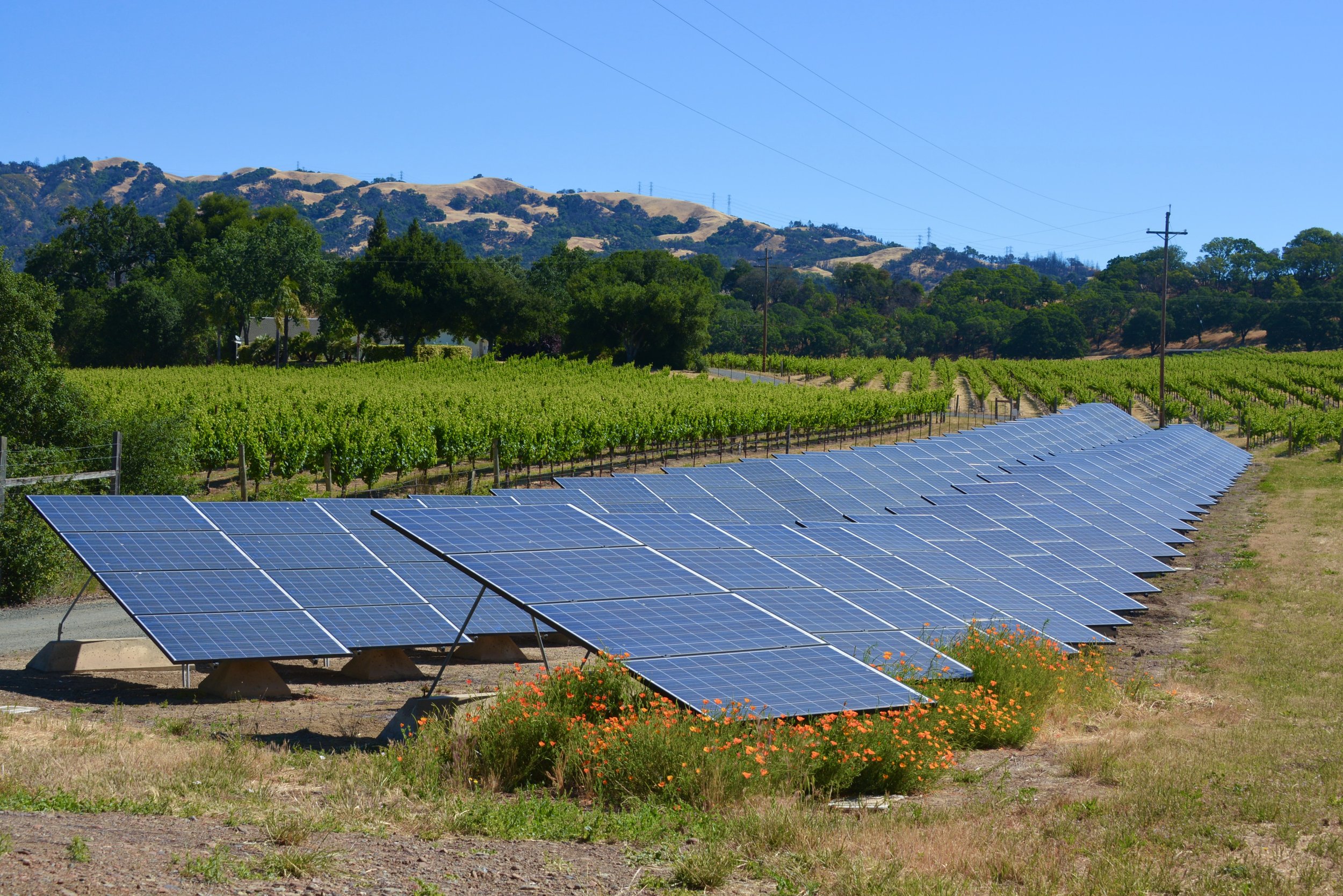
Sustainability at Rio Lago
Respecting the Land & Adapting to Climate Change
Our Vision
As a family-run business, we are committed to investing in our resilience and sustainability today, so that we can produce premium grapes for generations to come. It is in this spirit that we are proud to be certified by the California Sustainable Winegrowing Alliance.
Soil Health
Our Soils
Rio Lago’s farming strategy begins with soil health – because premium wines cannot be made without premium grapes, and premium grapes cannot be sustainably produced unless they’re grown on healthy, regenerative soils. Rio Lago is blessed with a diversity of unique, premier soils, from volcanic ‘terra rosa’ compositions in the eastern corner, to unique clay-loams in the west along the Russian River.
Regenerative Farming Practices
We carry out a number of farming practices to strengthen the soil microbiome and promote healthy soils. First, we plant a number of cover crops including peas, beans, and other grasses between rows. Utilizing cover crops provides a wide range of benefits – weed suppression, increased populations of microorganisms and beneficial insects, erosion control, and much more. To strengthen these benefits and increase levels of organic matter, we also apply a hefty dose of compost annually, and implement either ‘no till’ or ‘conservation till’ practices. Our soil health program not only allows us to achieve our quality goals, but also combats climate change by increasing carbon sequestration.
Water Conservation
Irrigation Strategy
Rio Lago varies significantly from block to block. We grow different varietals, use different rootstocks, plant on a wide range of soils, and even experience different microclimates. All of these factors contribute to striking differences in water demands across the vineyard. It is against this backdrop of ‘unevenness’ that we continuously strive to maximize efficiency with our water use. Using a network of drip lines, we’re able to precisely control flow so that we can match water applications to varying water demands – even within sub-regions of vineyard blocks. Our precision irrigation strategy not only improves quality, but it also allows us to conserve water by avoiding unnecessary irrigation.
5-Acre Backup Pond
To ensure reliable access to water, we use top of the line ‘Amaid’ filters with automated backwashing. These filters also allow us to utilize the properties’ 5 acre pond as an irrigation backup.
Energy Resilience
Solar at Rio Lago
Transitioning to renewable energy was an important step forward in improving Rio Lago’s environmental impacts. All of our solar systems have been meticulously designed to complement Rio Lago's unique landscape. Here's a snapshot of our clean energy journey:
2011: Our initial solar system comprising 144 modules was installed
2016: Our commitment grew, and we added another 120 modules to meet the energy demands of the vineyard’s irrigation system.
2017-2023: Three more solar systems were installed, ensuring all of Rio Lago's buildings are powered sustainably.
As of 2023, our solar capacity is over 104 KW, sized to meet the energy needs of Rio Lago’s farming operations.
State of the art Backup Generator
Given the increased likelihood of blackouts from heatwaves and fires, to ensure Rio Lago’s operations have a reliable source of power 24/7, in 2018, we invested in a 130 KW diesel backup generator.
Respecting Habitat
Ecology of Rio Lago
Surrounding the 105 acre vineyard, Rio Lago has 120 acres of riparian zones and oak woodlands – home to an abundance of wildlife. Over the last 30 years there have been ongoing efforts to maintain and improve habitat in these areas. We have planted hundreds of native trees and shrubs, and strategically installed dozens of bird and owl boxes to support local avian populations – including the Western Bluebird, now classified as a climate threatened species. Thanks to the owl boxes, we now have the added benefit of enjoying a parliament of owls on the property who control the rodent population.
Re-wilding
In 2013, we began a multistage habitat restoration project. This project first aimed at covering a large grassy open slope in an effort to create a wildlife corridor by connecting the oak woodlands along our property’s hilltop to the shoreline of the pond below. Six years later the once exposed slope is now covered with oak trees, manzanita shrubs, river birches, and red willow trees carefully selected to enhance local bird, butterfly, insect, and native bee habitats.
Climate Mitigation
In 2020, in partnership with the California Land Stewardship Institute and Sonoma County Winegrowers, we participated in the Climate Adaptation Pilot program to estimate the net release of emissions from Rio Lago’s farming operations. Based on current on-site farming practices and fuel use, it is estimated that Rio Lago’s net-release of GHG emissions is -360 tCO2e (tonnes of CO2 equivalent) annually. This means that more emissions are pulled from the atmosphere and fixed into the soil compared to the level of emissions released from Rio Lago’s on-site operations on an annual basis (figure 1)
Over time, our goal is to shrink and eliminate our emission sources while growing carbon sinks as much as possible. We plan to achieve this goal through continual electrification of our operations as well as increasing the amount of plants on the property, such as hedge rows.
Community Engagement
In most vineyards and wineries, the production of grapes and wine would not be possible without the hard work of Spanish speaking laborers. Rio Lago values the well being of these vineyard workers, many with families whose children go to local schools. To close the learning gap between their children and the English speaking students, Lynn Horowitz, Co-owner of Rio Lago, started a free evening ESL school in 2009 at the Alexander Valley School campus. The objective was to integrate the whole family into the community of learning: Teaching English as a second language to parents, and having their teens learn leadership skills while taking care of the younger children.
So far, the program has resulted in over 340 students receiving certificates, enabling them to advance in many ways as a result of their improved communication skills. The school is still going strong and has moved recently to the Healdsburg Community Center where many additional educational programs are offered in affiliation with the non-profit Corazon Healdsburg









